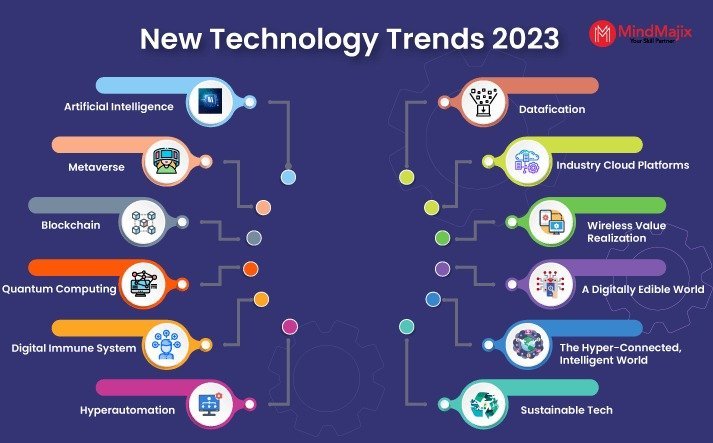The 21st century has witnessed an unparalleled surge in technological advancements that have revolutionized the way we live, work, and interact. From the rise of smartphones to the integration of artificial intelligence, various technological trends have shaped our world and continue to do so at an astonishing pace. In this article, we’ll explore the top 20 new technology trends that have defined the 21st century.
- Smartphones and Mobile Revolution: The proliferation of smartphones has transformed how we communicate, access information, and conduct business. These devices are not just phones; they are powerful computers that fit in our pockets.
- Artificial Intelligence (AI): AI has made remarkable strides, enabling machines to mimic human intelligence. Applications range from virtual assistants like Siri to complex data analysis and autonomous vehicles.
- Internet of Things (IoT): The IoT connects everyday objects to the internet, allowing them to gather and exchange data. This has led to the rise of smart homes, wearable devices, and more efficient industrial processes.
- Blockchain Technology: Beyond its association with cryptocurrencies, blockchain offers secure, transparent, and tamper-proof ways of recording transactions, with potential applications in supply chain management and digital identity verification.
- Augmented Reality (AR) and Virtual Reality (VR): AR and VR technologies have transformed entertainment, education, and even remote collaboration by immersing users in virtual environments or enhancing real-world experiences.
- Renewable Energy Solutions: As concerns about climate change grow, technologies like solar and wind power have gained traction, offering sustainable alternatives to traditional energy sources.
- Biotechnology and CRISPR: Advances in biotechnology, particularly CRISPR gene-editing technology, have the potential to revolutionize healthcare by treating genetic disorders and modifying organisms.
- 5G Connectivity: The fifth generation of wireless technology, 5G, promises faster speeds and lower latency, paving the way for innovations like autonomous vehicles and remote surgery.
- Drones and Autonomous Vehicles: Drones and self-driving cars are reshaping industries such as logistics, transportation, and agriculture by offering more efficient and automated solutions.
- Quantum Computing: Quantum computers have the potential to solve complex problems far faster than classical computers, impacting fields like cryptography, optimization, and material science.
- Smart Cities: Urban areas are becoming more connected and efficient through the integration of data-driven technologies, enhancing everything from traffic management to waste disposal.
- Precision Agriculture: By utilizing sensors, data analytics, and automation, precision agriculture optimizes crop yields, minimizes resource usage, and reduces environmental impact.
- 3D Printing: Also known as additive manufacturing, 3D printing is revolutionizing industries by enabling the creation of customized products, prototypes, and even human tissues.
- Neurotechnology: Advancements in neurotechnology are leading to brain-computer interfaces that could enhance communication for individuals with disabilities and expand our understanding of the brain.
- Clean Water Technologies: Innovative solutions are addressing the global water crisis through desalination, water purification technologies, and efficient water management systems.
- Space Exploration and Commercialization: Private companies are making space travel more accessible, with potential benefits ranging from asteroid mining to establishing colonies on other planets.
- Cybersecurity Advancements: As technology advances, so do cyber threats. New cybersecurity technologies, including AI-driven threat detection and biometric authentication, are crucial for safeguarding digital assets.
- Biometric Technology: Biometrics, such as facial recognition and fingerprint scanning, are becoming mainstream for secure access control, payments, and identity verification.
- Nanotechnology: Nanotechnology involves manipulating matter at the atomic and molecular scale. It has applications in medicine, electronics, and materials science, enabling breakthroughs in diverse fields.
- Health Tech and Telemedicine: The COVID-19 pandemic accelerated the adoption of telemedicine and digital health solutions, transforming the way we receive medical care and monitor our health.
Conclusion
The 21st century has introduced us to a whirlwind of technological innovation, redefining the boundaries of what’s possible. These top 20 technology trends have not only changed our daily lives but have also laid the groundwork for a future that holds even more astonishing advancements. As we move forward, it’s essential to navigate these trends responsibly, considering their ethical, social, and environmental implications, to ensure that technology continues to enhance human well-being and drive progress.

